Germany Travel Restrictions
Traveler's COVID-19 vaccination status

Traveling from the United States to Germany
Open for vaccinated visitors
COVID-19 testing
Not required
Not required for vaccinated visitors
Restaurants
Not required in public spaces.
Germany entry details and exceptions
Ready to travel, find flights to germany, find stays in germany, explore more countries on travel restrictions map, destinations you can travel to now, dominican republic, netherlands, philippines, puerto rico, switzerland, united arab emirates, united kingdom, know when to go.
Sign up for email alerts as countries begin to open - choose the destinations you're interested in so you're in the know.
Can I travel to Germany from the United States?
Most visitors from the United States, regardless of vaccination status, can enter Germany.
Can I travel to Germany if I am vaccinated?
Fully vaccinated visitors from the United States can enter Germany without restrictions.
Can I travel to Germany without being vaccinated?
Unvaccinated visitors from the United States can enter Germany without restrictions.
Do I need a COVID test to enter Germany?
Visitors from the United States are not required to present a negative COVID-19 PCR test or antigen result upon entering Germany.
Can I travel to Germany without quarantine?
Travelers from the United States are not required to quarantine.
Do I need to wear a mask in Germany?
Mask usage in Germany is not required in public spaces.
Are the restaurants and bars open in Germany?
Restaurants in Germany are open. Bars in Germany are .

Since 1 August 2021: New regulations for travelers entering or transiting in Germany
Since 1 August 2021, new regulations apply for entry into the Federal Republic of Germany. Persons aged 12 or over must, as a rule, possess a negative test result or proof of vaccination or recovery at the time of departure. The most important points at-a-glance:
- Designation of risk areas: As of 1 August 2021, risk areas will distinguish between two categories: high-risk areas and areas of variants of concern. The category of “basic” risk area will no longer apply
- Obligation to quarantine: If entering Germany following a stay in a high-risk area, a 10-day quarantine is mandatory for persons who are neither fully vaccinated nor recovered. Quarantine can be ended early by submitting proof of vaccination or recovery or a negative test result no earlier than five days after entry. Following a stay in an area of variants of concern, the duration of quarantine may not be shortened
- Entry when accompanied by children: Children under the age of 12 are exempt from the obligation to provide proof. In their case, quarantine after a stay in a high-risk area automatically ends after the fifth day following entry into Germany
- Vaccinated and recovered persons: Proof of vaccination or of recovery from COVID-19* can replace a negative test certificate and exempt from quarantine on entry. This currently does not apply for passengers who have spent time in an area of variants of concern prior to entry. A mandatory 14-day quarantine also applies to vaccinated travellers – regardless of the type of vaccine taken
- Obligation to register: The Digital Registration on Entry (DEA) remains mandatory for entry from high-risk areas and areas of variants of concern
- Flights from virus-variant areas: There is no longer a ban on carriage for transit passengers from virus-variant areas as long as they have a connecting flight to a Schengen or Non-Schengen country (onward flight in Frankfurt or Munich within 24 hours; the transit area in Frankfurt or Munich may not be left)
- Transit passengers: Transiting in Germany to a destination outside of Germany is possible and does not require proof of vaccination/immunity, a negative test result nor an online registration
The following still applies:
- The negative Covid-19 test result at time of departure, which may be required for entry, must be done no more than 48 hours (antigen)** or no more than 72 hours (PCR, RT-LAMP or TMA) before the time of entry into Germany (time of swab). The corresponding negative test certificate or, if applicable, proof of vaccination or immunity must be presented before departure and upon entry
- Certificates are accepted in English, French, German, Italian or Spanish; certified self-tests are also valid
- For more information on the designation of international risk areas, click here
For detailed up-to-date information on quarantine and testing requirements for entry into Germany, please visit lufthansa.com » Learn more about entry into Germany * Travelers are considered vaccinated if they have completed their vaccination series more than 14 days ago with a vaccine approved in the EU. These are currently the vaccines from BioNTech/Pfizer, Moderna, AstraZeneca and Johnson & Johnson. The proof of recovery must be a PCR/LAMP/TMA test proof that is at least 28 days and at most six months old ** Exception: Antigen tests only 24 hours if arriving from an area of variants of concern
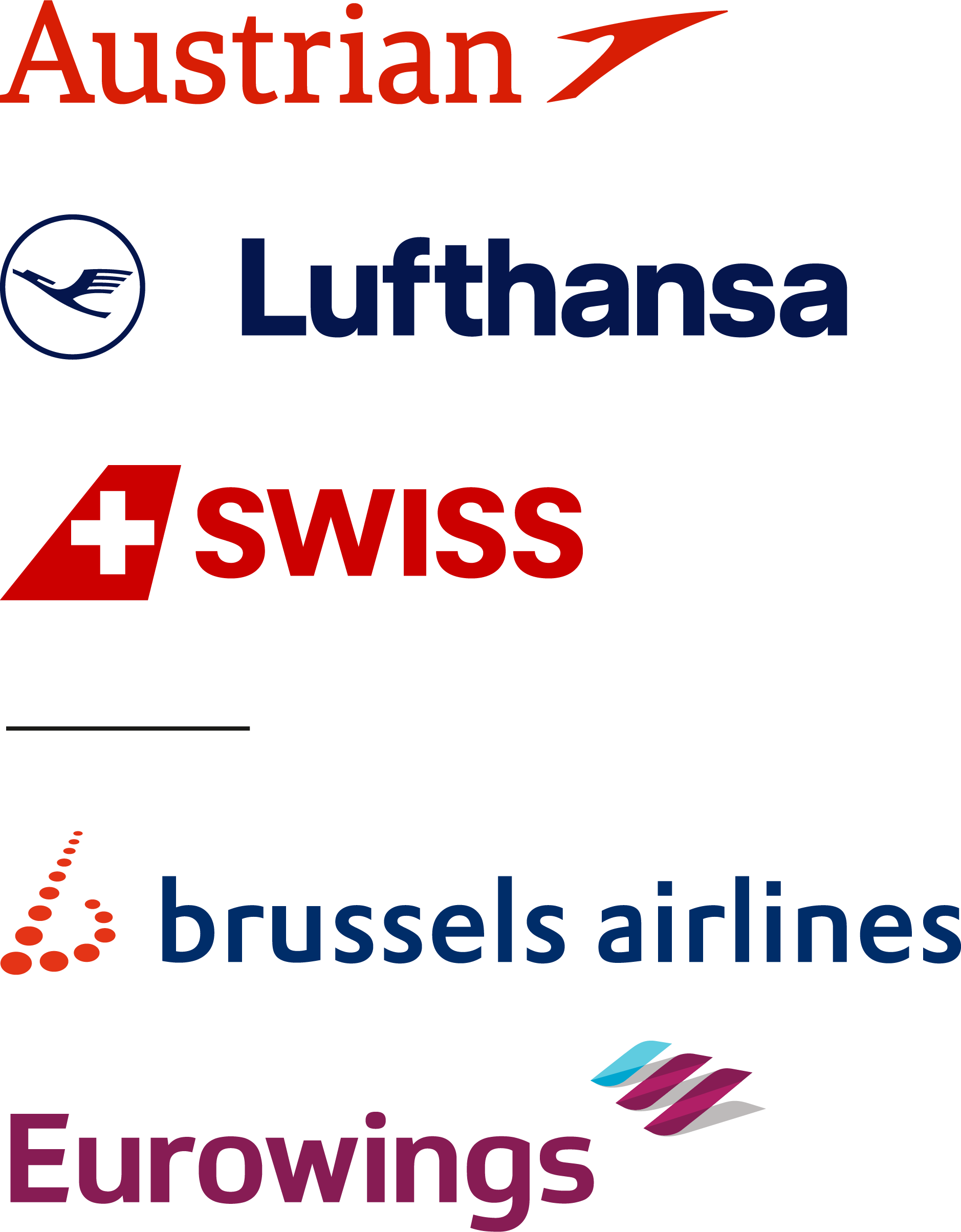
To personalize and improve your website experience this site uses cookies. By using irreg.lufthansaexperts.com, you agree to our cookie policy
Cookies on GOV.UK
We use some essential cookies to make this website work.
We’d like to set additional cookies to understand how you use GOV.UK, remember your settings and improve government services.
We also use cookies set by other sites to help us deliver content from their services.
You have accepted additional cookies. You can change your cookie settings at any time.
You have rejected additional cookies. You can change your cookie settings at any time.
Entry requirements
This information is for people travelling on a full ‘British citizen’ passport from the UK. It is based on the UK government’s understanding of the current rules for the most common types of travel.
The authorities in Germany set and enforce entry rules. If you’re not sure how these requirements apply to you, contact the German Embassy in the UK .
COVID-19 rules
There are no COVID-19 testing or vaccination requirements for travellers entering Germany.
Passport validity requirements
Germany follows Schengen area rules . Your passport must:
- have a ‘date of issue’ less than 10 years before the date you arrive – if you renewed your passport before 1 October 2018, it may have a date of issue that is more than 10 years ago
- have an ‘expiry date’ at least 3 months after the day you plan to leave the Schengen area
Check with your travel provider that your passport and other travel documents meet requirements. Renew your passport if you need to.
You will be denied entry if you do not have a valid travel document or try to use a passport that has been reported lost or stolen.
If you have a residence permit, you must have a valid passport for the duration of your stay. Renew it before the expiry date.
Visa requirements
You can travel without a visa to the Schengen area , which includes Germany, for up to 90 days in any 180-day period. This applies if you travel:
- as a tourist
- to visit family or friends
- to attend business meetings, cultural or sports events
- for short-term studies or training
The requirements for working in Germany are different.
If you’re travelling to other Schengen countries as well, make sure your whole visit is within the 90-day limit. Visits to Schengen countries in the 180 days before you travel count towards your 90 days.
Make sure you get your passport stamped on entry and exit.
If you’re a visitor, border guards will look at your entry and exit stamps to check you have not overstayed the 90-day visa-free limit for the Schengen area.
If your passport is missing a stamp, show evidence of when and where you entered or left the Schengen area (for example, boarding passes or tickets) and ask the border guards to add the date and location in your passport.
At German border control, you may need to:
- show a return or onward ticket
- prove that you have enough money for your stay
Staying longer than 90 days in a 180-day period
To stay longer, you must meet the German government’s entry requirements. Check which type of visa or permit you need with the German Embassy in the UK .
If you’re in Germany with a residence permit or long-stay visa, this does not count towards your 90-day visa-free limit.
Read about passport stamping if you live in Germany .
Vaccine requirements
For details about medical entry requirements and recommended vaccinations, see TravelHealthPro’s Germany guide .
Customs rules
There are strict rules about goods you can take into and out of Germany . You must declare anything that may be prohibited or subject to tax or duty.
Taking food into Germany
You cannot take meat, milk or products containing them into EU countries . There are some exceptions such as powdered baby milk, baby food and special foods or pet feed required for medical reasons.
Taking money into Germany
You must declare any amount above 10,000 euros in cash or other payment types. You can find more information on the German Federal Foreign Office website.
Related content
Is this page useful.
- Yes this page is useful
- No this page is not useful
Help us improve GOV.UK
Don’t include personal or financial information like your National Insurance number or credit card details.
To help us improve GOV.UK, we’d like to know more about your visit today. Please fill in this survey (opens in a new tab) .
- Shop search
- Flight search
Transferring at FRA
Transferring at frankfurt airport, to make your transfer as smooth as possible, we've compiled all important information for you., important current notice.
Starting September 1, 2024 an EU-wide restriction on taking liquids in carry-on luggage will be applied again for all passenger security checkpoints (including CT scanners):
Only liquids in containers no larger than 100 milliliters may be taken, and these must be placed inside a re-closable bag with a maximum capacity of 1 liter.
The checkpoints equipped with CT technology will continue to benefit passengers because electronic devices and allowed amounts of liquids, aerosols, and gels do not have to be removed from the carry-on luggage.
Service Points

The friendly, multilingual service staff will be happy to help you at Frankfurt Airport.
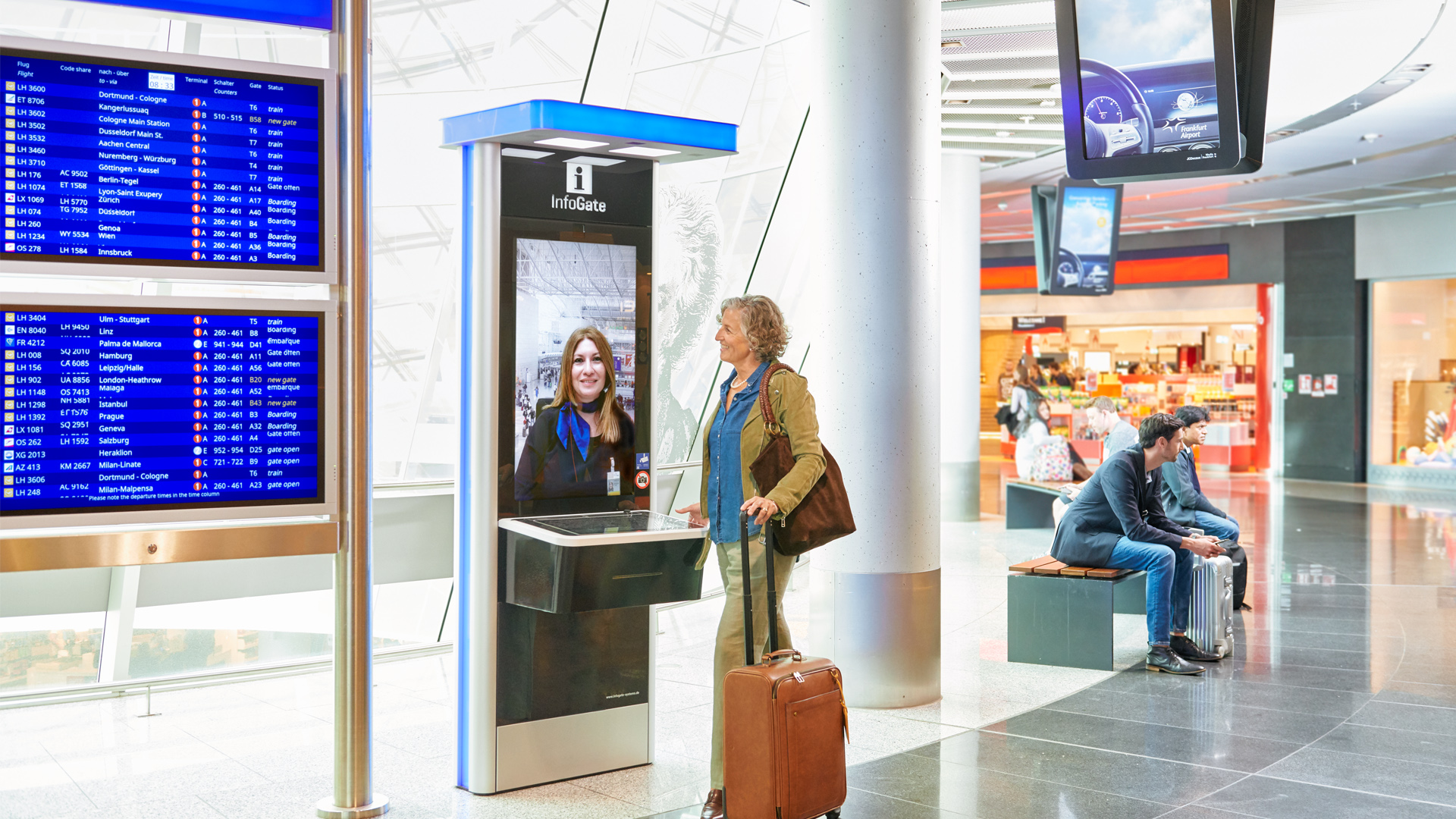
Talk virtually with our information staff from different locations in the terminals.
If you do not yet have a boarding pass for your connecting flight, you can obtain one at your airline's transfer counters. If there is no transfer desk on site, you will receive your boarding pass for the connecting flight at the information desk of the departure gate as well as in the public area at the check-in desk of your airline.
In most cases, your checked baggage will be automatically checked through to your destination airport. If this is not the case, pick up your baggage at baggage claim and check it in again with your airline. This also applies if you have booked your flight connections individually.
Passenger tunnel A/B

If you are changing between piers A and B in Terminal 1, you can use the passenger tunnel. On the moving walkways, you can enjoy the gigantic work of art by Martin Liebscher.
Terminal change via shuttle buses
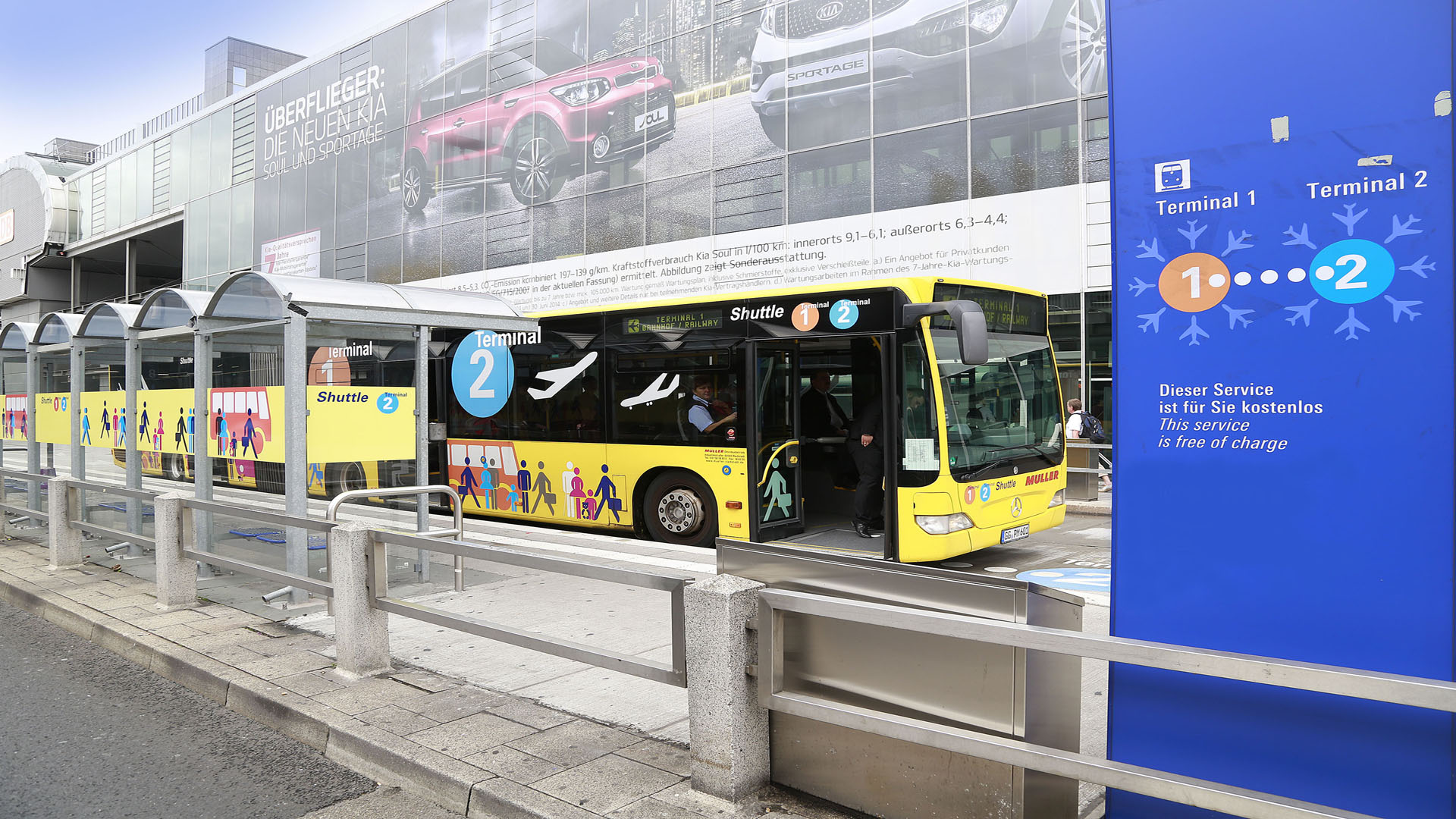
- The yellow shuttle buses are a convenient way to transfer between terminals.
- The stops are located in front of Terminals 1 and 2 and at the P36 bus parking lot for long-distance buses.
- They leave every 10-15 minutes (depending on the time of day) and operate daily around the clock (24/7).
- The shuttle is free of charge.
Terminal change via SkyLine
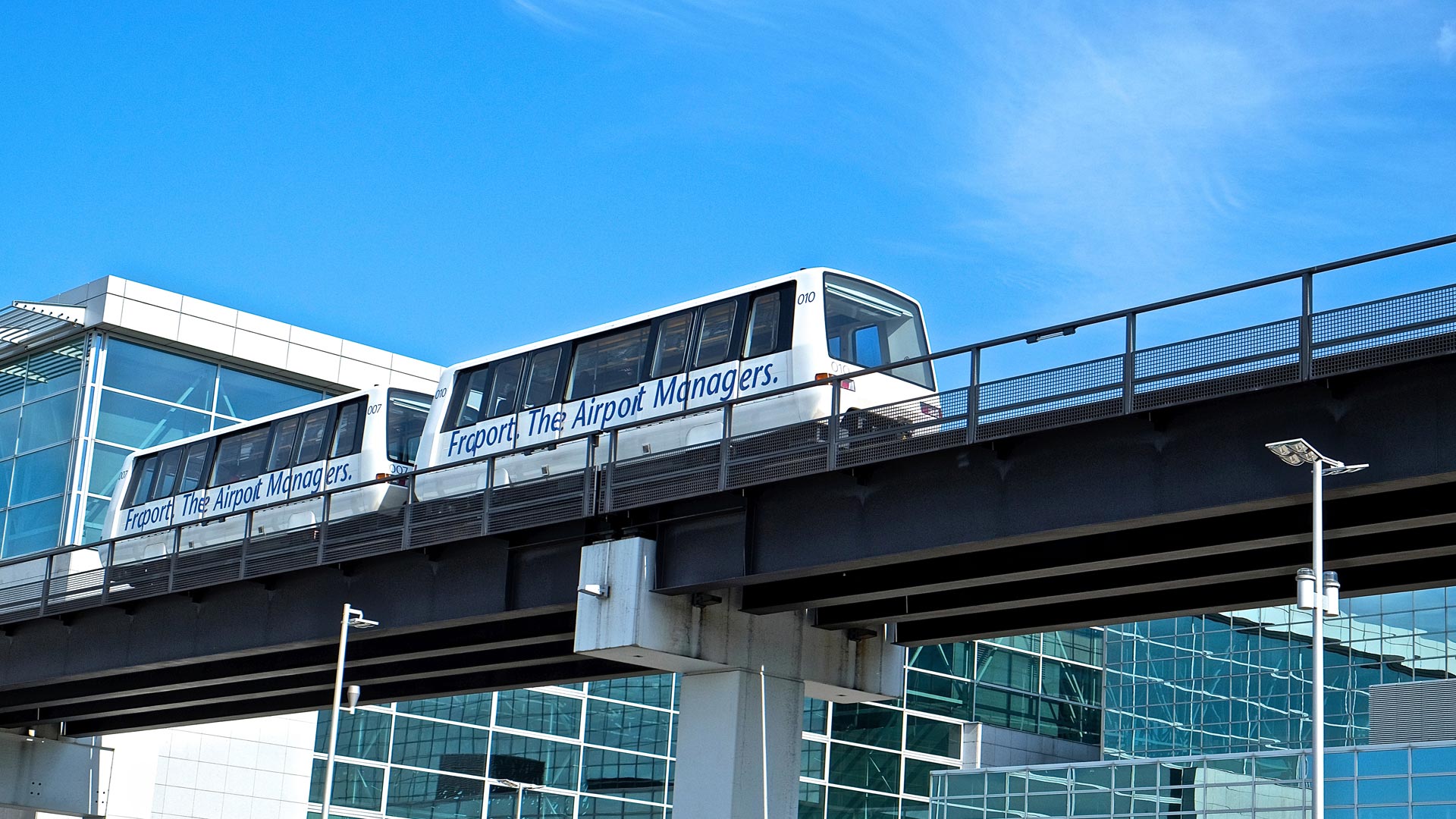
If you have to change between areas A, B, C or Z (Terminal 1) and areas D or E (Terminal 2), the signs will take you to the free SkyLine.
It leaves every 2-3 minutes and operates from 5:00 a.m. until 11:00 p.m.
Passengers can board and alight from the public area as well as from the transit area.
The stops are located in:
- Terminal 1, A/Z (transit area)
- Terminal 1, B/C (access via departure hall B on level 2)
- Terminal 1, C (transit area)
- Terminal 2, D/E (access via Shopping Plaza on level 3)
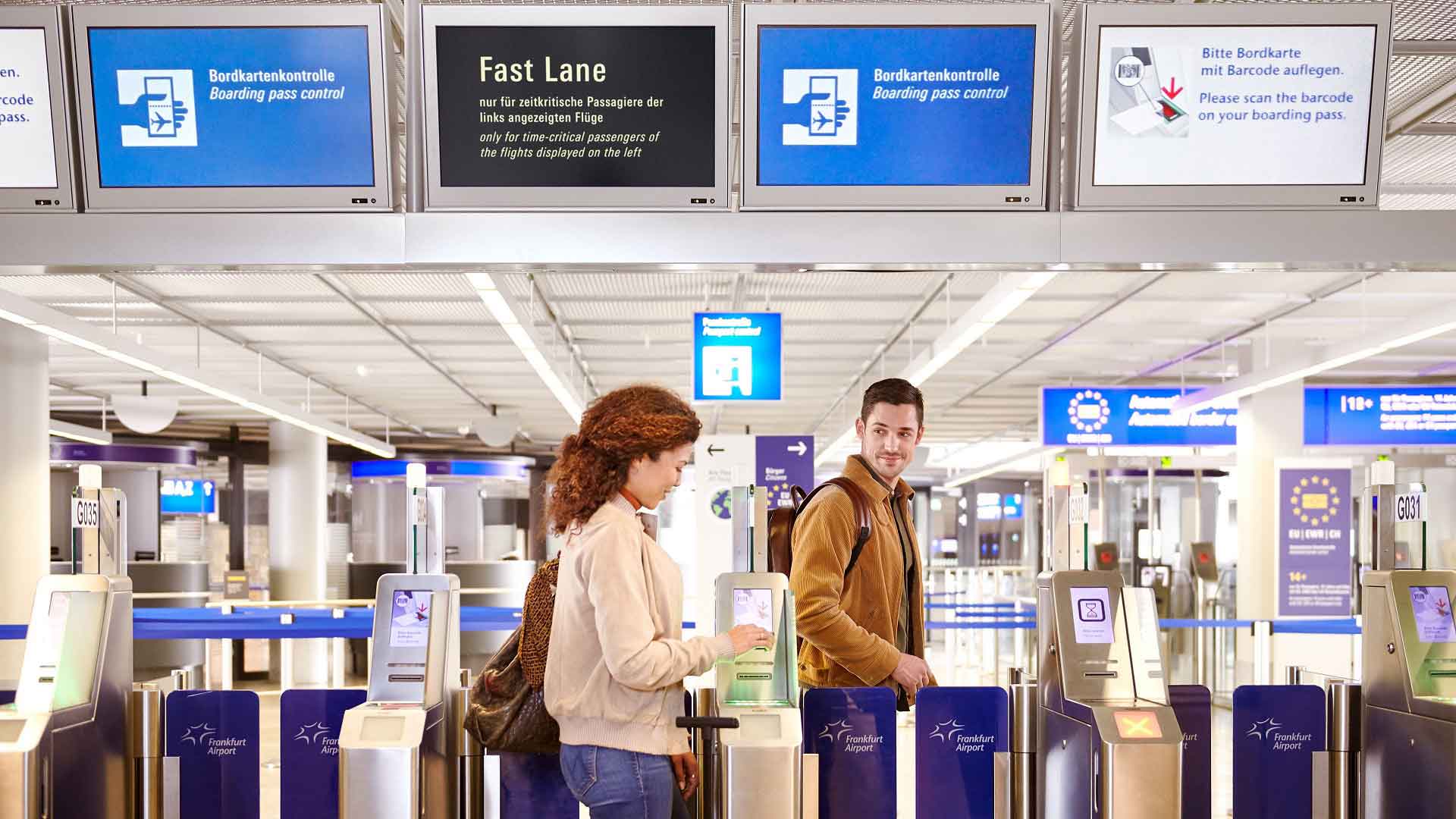
Fast lanes are available at most major security checks. If it is getting tight with the connecting flight and your flight is shown in the monitor at the checkpoint, you can take a shortcut to the gate via the fast lanes.
Security Check Procedures
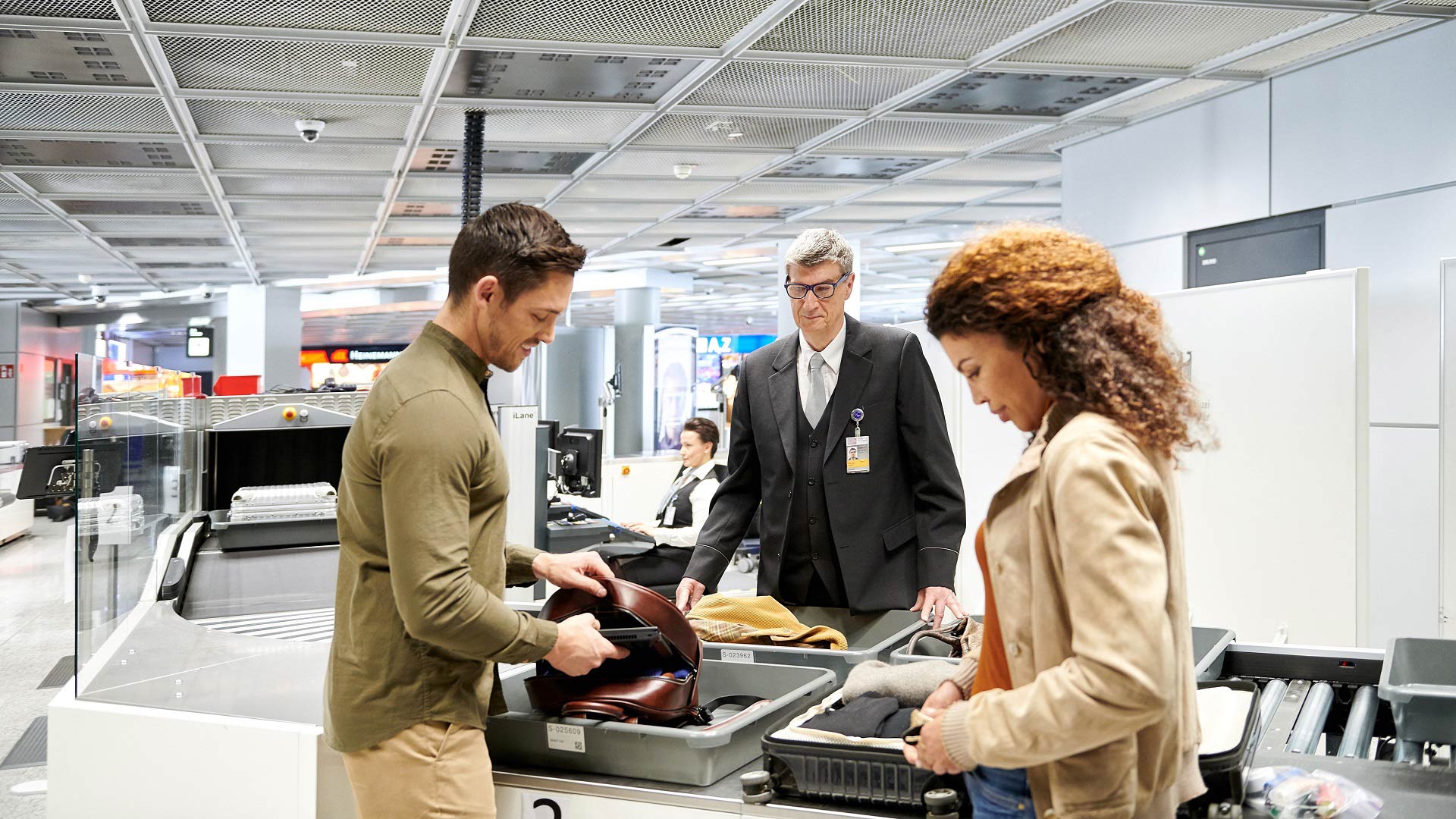
In most cases, you must clear security checks on your way through the airport. Please allow enough time for them. Also please observe the restrictions on carrying liquids and gels into the aircraft cabin. Please note that you may not carry liquids bought in duty free shops at airports outside the EU when flying from Frankfurt Airport. This also applies to any duty-free items that you have bought on board a non-EU airline.
Whether or not you must clear a passport check depends on whether the airport you have arrived from and your destination are within or outside the Schengen Area.
- You are arriving from and are heading for an airport within the Schengen Area: Usually there is no ID check.
- You are arriving from a Schengen country and are traveling to a non-Schengen country: You will probably have to clear a passport check. Depending on your nationality, you may require a transit visa. If in doubt, please contact an embassy or consulate of your country.
- You are arriving from outside the Schengen Area and your destination is in a non-Schengen country: Usually no passport check is mandatory, provided that you do not leave the transit zone. Depending on your nationality, you may require a transit visa. If in doubt, please contact an embassy or consulate of your country.
- You are arriving from an airport in a non-Schengen country and are traveling to a destination within the Schengen Area: You will probably have to clear a border check. Depending on your nationality, you may require a transit visa. If in doubt, please contact an embassy or consulate of your country.
EasyPASS and EasyPASS-RTP
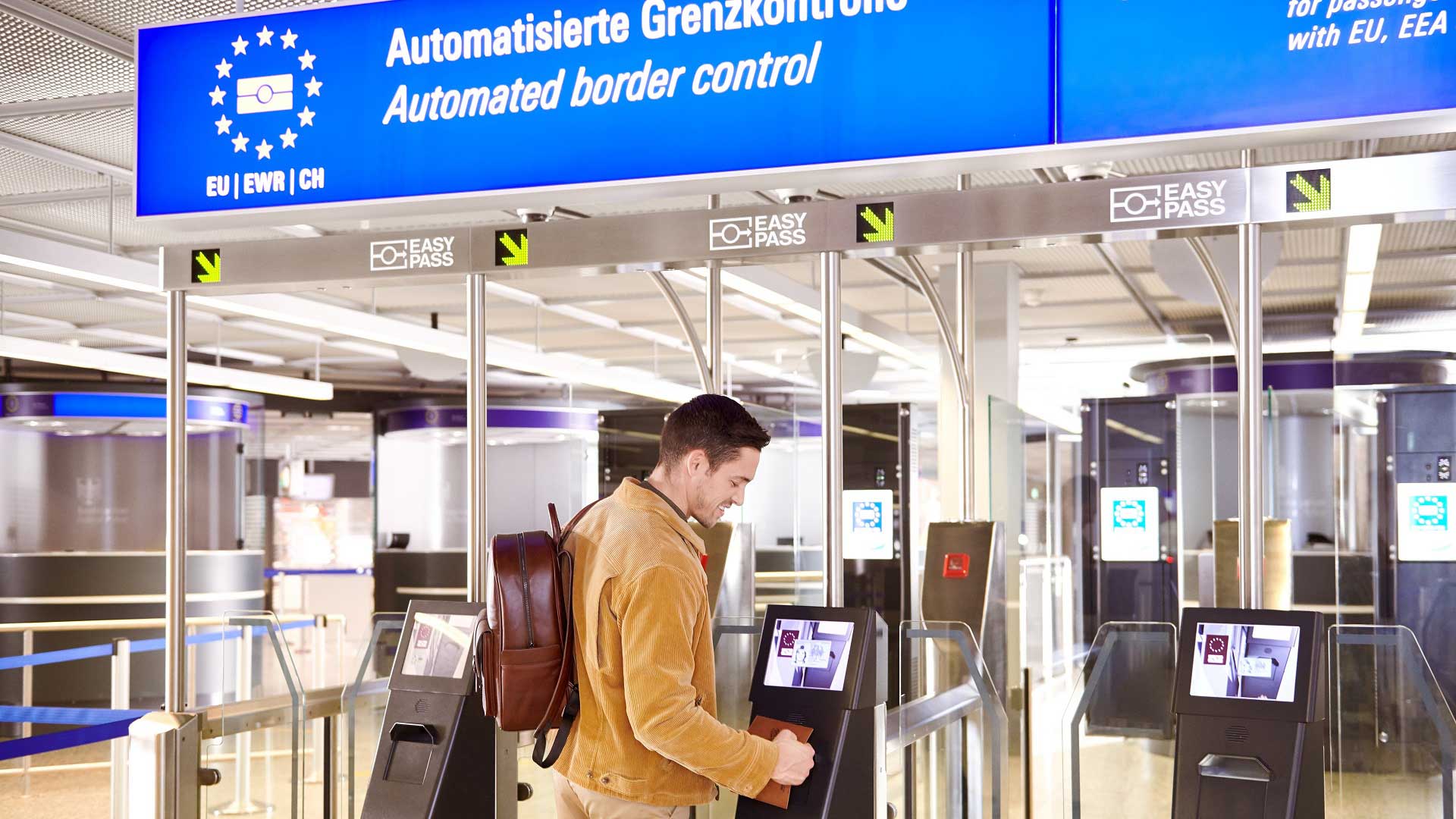
EasyPASS and EasyPASS-RTP allow you to enter and exit the country faster and easier. The automated border control system allows travelers to pass through passport control within seconds.
Facilities & Services

We offer numerous free services, such as Gaming World, Movie World or even Leisure Zones, to ensure a relaxed and entertaining stay at Frankfurt Airport. Furthermore, you will find numerous lounges, a transit hotel or the napcabs in the terminals.

Numerous stores are located in both terminals, providing a unique variety of products from all over the world.
Eat & drink
.jpg/_jcr_content/renditions/original./20231006_rb-gastronomie_FRAPORT_17_937%20(1).jpg)
In both terminals there are numerous restaurants and snack bars that leave nothing to be desired.
NapCabs in Terminal 1

Sleep, relax or work. You can do all this away from the hustle and bustle - in the middle of Terminal 1, in transit area Pier A Schengen or in transit area B. We wish you a restful stay.
You may also be interested in
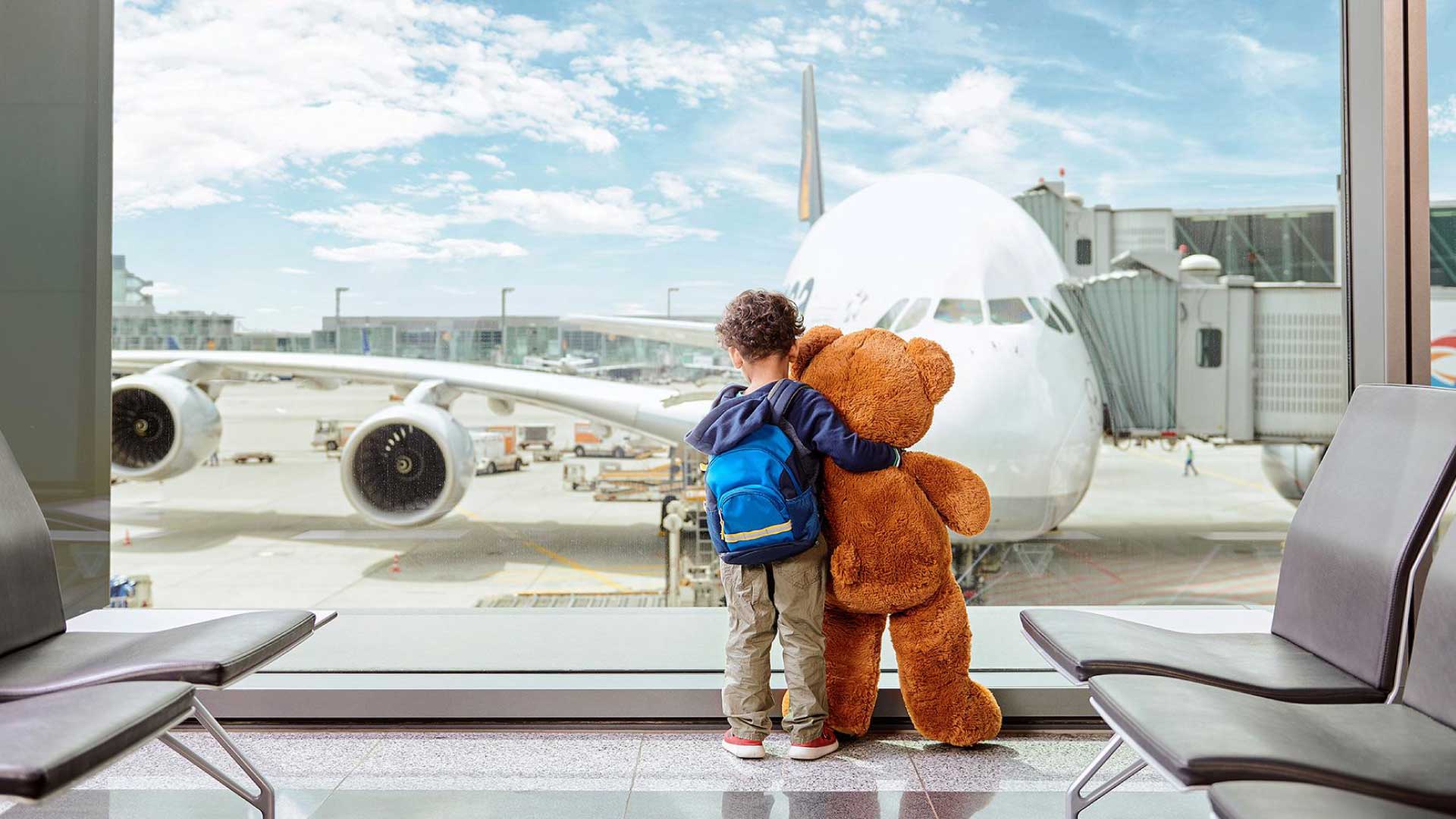
Security Alert May 17, 2024
Worldwide caution.
- Travel Advisories |
- Contact Us |
- MyTravelGov |
Find U.S. Embassies & Consulates
Travel.state.gov, congressional liaison, special issuance agency, u.s. passports, international travel, intercountry adoption, international parental child abduction, records and authentications, popular links, travel advisories, mytravelgov, stay connected, legal resources, legal information, info for u.s. law enforcement, replace or certify documents.
Before You Go
Learn About Your Destination
While Abroad
Emergencies
Share this page:
Travel Advisory May 1, 2024
Germany - level 2: exercise increased caution.
Reissued after periodic review with minor edits
Exercise increased caution in Germany due to terrorism .
Country Summary: Terrorist groups keep planning attacks in Germany. Terrorists may attack with little or no warning. They target tourist locations and transportation hubs. They also target markets/shopping malls and local government facilities. They target hotels, clubs, and restaurants. They also attack places of worship, parks, and major sporting and cultural events. They target schools, airports, and other public areas.
Read the country information page for additional information on travel to Germany.
If you decide to travel to Germany:
- Be aware of your surroundings when traveling to tourist locations and crowded public venues.
- Follow the instructions of local authorities.
- Monitor local media for breaking events and adjust your plans based on new information.
- Enroll in the Smart Traveler Enrollment Program ( STEP ) to receive Alerts and make it easier to locate you in an emergency.
- Follow the Department of State on Facebook and Twitter .
- Review the Country Security Report for Germany.
- Visit the CDC page for the latest Travel Health Information related to your travel.
- Prepare a contingency plan for emergency situations. Review the Traveler’s Checklist .
Embassy Messages
View Alerts and Messages Archive
Quick Facts
Three months beyond planned date of departure from the Schengen area.
Not required for stays under 90 days.
10,000€ (euros or equivalent).

Embassies and Consulates
U.S. EMBASSY BERLIN Clayallee 170 14191 Berlin Federal Republic of Germany Telephone: +(49) (30) 8305-0 Emergency After-Hours Telephone: +(49) (30) 8305-0 Fax: +(49) (30) 8305-1050 Email: [email protected]
U.S. CONSULATE GENERAL FRANKFURT Giessener Str. 30 60435 Frankfurt am Main Federal Republic of Germany Telephone: +(49) (69) 7535-0 Fax: +(49) (69) 7535-2252 Passport, Consular Report of Birth Abroad, and Citizenship: [email protected] All other questions: [email protected]
U.S. CONSULATE GENERAL MUNICH Koeniginstrasse 5 80539 Munich Federal Republic of Germany Telephone: +(49) (89) 2888-0 Emergency After-Hours Telephone: +(49) 89-2888-0 Fax: If you need to send a fax, please email first to obtain a one-time use fax number. Email: [email protected]
U.S. CONSULATE GENERAL DUSSELDORF Willi-Becker-Allee 10 40227 Duesseldorf Federal Republic of Germany Telephone: +(49) (69) 7535-0 Emergency After-Hours Telephone: +(49) (30) 8305-0 Fax: +(49) (69) 7535-2252 Consular services are provided through the U.S. Consulate in Frankfurt.
U.S. Consulate General Hamburg Kehrwieder 8 20457 Hamburg Federal Republic of Germany Telephone: +(49) (30) 8305-0 Emergency After-Hours Telephone: Contact the U.S. Embassy in Berlin: +(49) (30) 8305-0 Fax: +(49) (30) 8305-1050 Consular services are provided through the U.S. Embassy in Berlin.
U.S. Consulate General Leipzig Wilhelm-Seyfferth-Str. 4 04107 Leipzig Federal Republic of Germany Telephone: +(49) (30) 8305-0 Emergency After-Hours Telephone: Contact the U.S. Embassy in Berlin: +(49) (30) 8305-0 Fax: +(49) (30) 8305-1050 Consular services are provided through the U.S. Embassy in Berlin.
Destination Description
See the Department of State’s Fact Sheet on Germany for information on U.S. - Germany relations.
Entry, Exit and Visa Requirements
Traveling Through Europe : If you are planning to visit or travel through European countries, you should be familiar with the requirements of the Schengen Agreement.
- In Europe's Schengen area , your passport generally must be valid for at least six months at the time of your entry. Although Germany only requires travelers to have three months of validity remaining beyond their intended departure date, airlines may still deny boarding for having less than six months validity, especially if transiting additional Schengen countries.
- If you plan on transiting a Schengen country, review our U.S. Travelers in Europe page .
- You will need sufficient proof of funds and a return plane ticket .
- For additional information about visas for the Schengen area, see the Schengen Visa page.
- If traveling with prescription medication, review the information below regarding pharmaceuticals to avoid potential fines and confiscation.
Carry identification with you at all times.
The U.S. Department of State is unaware of any HIV/AIDS entry restrictions for visitors to, or foreign residents of, Germany.
Find information on dual nationality , prevention of international child abduction and customs regulations on our websites.
Safety and Security
Terrorism: Credible information indicates terrorist groups continue plotting possible attacks in Europe. European governments are taking action to guard against terrorist attacks; however, all European countries remain potentially vulnerable to attacks from transnational terrorist organizations.
Terrorist groups and those inspired by such organizations are intent on attacking U.S. citizens abroad. Terrorists are increasingly using less sophisticated methods of attack –including knives, firearms, and vehicles – to more effectively target crowds. Frequently, their aim is unprotected or vulnerable targets, such as:
- High-profile public events (sporting contests, political rallies, demonstrations, holiday events, and celebratory gatherings)
- Hotels, clubs, and restaurants frequented by tourists
- Places of worship
- Schools
- Shopping malls and markets
- Public transportation systems (including subways, buses, trains, and scheduled commercial flights)
For more information, see our Terrorism page.
Crime: Violent crime is rare in Germany, but can occur, especially in larger cities or high-risk areas such as on large metropolitan subway systems and in train stations, primarily during late night or early morning hours. Most incidents of street crime involve the theft of unattended items and pickpocketing. Theft and pickpocketing primarily take place at train stations, on public transportation, at tourist attractions, and at large public events. Always pay close attention to your valuables!
Be cautious and aware of your surroundings.
U.S. citizens should exercise caution when congregating in known expatriate hangouts.
Don’t buy counterfeit and pirated goods, even if they are widely available. They are illegal to bring back into the United States, and you could also be breaking local law.
Demonstrations: Demonstrations occur regularly in Germany. Large, public demonstrations take place for a variety of political and economic issues. Demonstrations tend to take place on politically significant holidays like German Labor Day (May 1) and during international summits hosted in Germany. Demonstration organizers must obtain prior police approval, and police routinely oversee participants.
- Demonstrations can be unpredictable; avoid areas around protests and demonstrations.
- Check local media for updates and traffic advisories.
- Strikes may interfere with travel plans. We strongly encourage travelers to check transportation schedule information prior to travel.
International Financial Scams: See the Department of State and the FBI pages for information.
Internet romance and financial scams are prevalent in Germany. Scams are often initiated through Internet postings/profiles or by unsolicited emails and letters. Most scammers pose as U.S. citizens who have no one else to turn to for help.
Tips to avoid scammers:
- Look for red flags like their location is far away, their profile was recently created or seems to be too good to be true, the pace of the relationship is moving too quickly, or they ask for money.
- Set up a phone call/video chat in the initial stages.
- Do a reverse image search on the profile picture.
- If they ask for help, you should refer to them to the closest U.S. Embassy or Consulate so we can work with local authorities to assist.
- If you believe you have been scammed, report the incident to local law enforcement right away and stop all communications with the scammer.
Common scams include:
- Romance/online dating
- Money transfers
- Lucrative sales
- Gold purchase
- Contracts with promises of large commissions
- Grandparent/relative targeting (kidnapping, arrested, medical emergency)
- Free Trip/luggage
- Inheritance notices
- Work permits/job offers
- Bank overpayments
Technology Usage Abroad: Mobiles Devices are vulnerable to compromise, theft, and physical damage anywhere in the world. Best practices prior to traveling abroad are keeping all software (operating system and apps) updated and using virtual private network and encrypted voice over IP (VoIP) applications if possible. Make sure that all VPN/VoIP are reputable, and U.S.-based. Do not connect to unknown open Wi-Fi. GPS Navigation Apps are helpful in getting U.S. citizens around in a foreign country. Prior to using the GPS app, make sure you research the route to make sure it is safe. GPS navigation app may give you the shortest route without safety consideration. Be cautious of using dating apps/online dating websites abroad as U.S. citizens can be targeted by scammers. Make sure to inform your friends and family of your whereabouts, meet at a well-known public location, and not consume suspicious food or drinks. Avoid traveling alone to bars or nightclubs.
Victims of Crime: Report crimes to the local police: in an emergency dial 112 for ambulance and 110 for the police and contact the U.S Embassy or nearest U.S. Consulate (see contact details above).
Remember that local authorities are responsible for investigating and prosecuting crimes.
See our webpage on help for U.S. victims of crime overseas .
We can:
- Help you find appropriate medical care
- Assist you in reporting a crime to the police
- Contact relatives or friends with your written consent
- Provide general information regarding the victim’s role during the local investigation and following its conclusion
- Provide a list of local attorneys
- Provide information on victim’s compensation programs in the United States
- Provide information on victim’s compensation and support in Germany
- Provide an emergency loan for repatriation to the United States and/or limited medical support in cases of destitution
- Help you find accommodation and arrange flights home
- Replace a stolen or lost passport
We also maintain information on our website on how to report child abuse situations to the local authorities.
Domestic Violence: U.S. citizen victims of domestic violence may contact the Embassy or the Consulates General in Frankfurt or Munich for assistance. Call 110 if you are in immediate danger.
Tourism: The tourism industry is generally well regulated, and rules are regularly enforced. Hazardous areas/activities are identified with appropriate signage, and professional staff is typically on hand in support of organized activities.
Germany sometimes experiences extreme weather conditions including floods, long periods of drought, and unusually harsh winters with vast amounts of snow even in urban areas. Numerous injuries and deaths occur every year in Germany’s Alpine and coastal regions. Most of the emergencies relate to the following sports: skiing, hiking, snowboarding, mountain biking, sledding, rock and mountain climbing, paragliding, and swimming. Those engaging in Alpine sports are strongly encouraged to register with German “Alpen Verein.”
In the event of an injury, appropriate medical treatment is widely available throughout the country. Outside of a major metropolitan center, it may take more time for first responders and medical professionals to stabilize a patient and provide life-saving assistance. U.S. citizens are encouraged to purchase medical evacuation insurance. See our webpage for more information on insurance providers for overseas coverage.
Local Laws & Special Circumstances
Criminal Penalties: You are subject to local laws. If you violate local laws, even unknowingly, you may be expelled, arrested, or imprisoned. Individuals establishing a business or practicing a profession that requires additional permits or licensing should seek information from the competent local authorities, prior to practicing or operating a business.
Furthermore, some laws are also prosecutable in the United States, regardless of local law. For examples, see our website on crimes against minors abroad and the Department of Justice website.
Arrest Notification: If you are arrested or detained, ask police or prison officials to notify the U.S. Embassy or nearest U.S. Consulate General immediately. See our webpage for further information.
Special Circumstances: Germany has strict customs regulations concerning:
- Temporary importation or exportation of firearms
- Military artifacts (particularly those of World War II)
- Medications/pharmaceuticals
- Business equipment
Under German law it is also illegal to bring into or take out of Germany any literature, music, or paraphernalia that glorifies fascism, the Nazi past, or the “Third Reich.”
Contact the German Embassy in Washington or one of the German consulates in the United States for specific information regarding customs requirements.
Faith-Based Travelers : See our following webpages for details:
- Faith-Based Travel Information
- International Religious Freedom Report – see country reports
- Human Rights Report – see country reports
- Hajj Fact Sheet for Travelers
- Best Practices for Volunteering Abroad
International Volunteers:
LGBTQI+ Travelers : There are no legal restrictions on same-sex sexual relations or the organization of LGBTQI+ events in Germany. Same-sex marriage is available in Germany. LGBTQI+ persons are protected by federal anti-discrimination laws, and LGBTQI+ Pride events are officially encouraged by most large city governments, including those in Berlin, Cologne, Hamburg, Frankfurt, and Munich.
See our page and section 6 of our Human Rights report for further details.
Travelers with Disabilities: The law in Germany prohibits discrimination against persons with disabilities, and the law is enforced. Social acceptance of persons with disabilities in public is as prevalent as in the United States. Expect accessibility to be limited in some older public transportation, lodging, and general infrastructure, especially outside major cities, but common in most urban infrastructure. Some older buildings and public transportation systems are less adapted to individuals with disabilities.
Check your hotel or destination to learn more about options to accommodate disabled traveler needs before visiting Germany.
The German National Tourist Board maintains information about accessibility and disability-friendly travel .
All German airports and Lufthansa offer services for disabled travelers.
The German National Railway, Deutsche Bahn , maintains a mobility resource webpage.
Students: See our Students Abroad page and FBI travel tips .
Women Travelers: See our travel tips for Women Travelers .
Germany has generally high-quality medical care and facilities. Prescript ion and over-the-counter medicines are widely available although brands and drug names differ from those available in the United States.
For emergency services in Germany, dial 112.
Ambulance services are widely available.
We highly recommend that all travelers review the U.S. Centers for Disease Control and Prevention’s Travelers’ Health webpage and general Traveler Advice for Germany.
- Review all sub-sections including the Travel Health Notices, Vaccines and Medicines, Non-Vaccine-Preventable Diseases, Stay Healthy and Safe, Healthy Travel Packing List, and After Your Trip.
- Reasons for Travel (for example: Adventure Travel, Spring Break Travel)
- Travelers with Special Considerations (for example: Allergies, Long-Term Travelers, and Expatriates)
- General Tips (for example: Traveling with Medications, Travel Vaccines)
The Department of State, U.S. embassies and U.S. consulates general do not pay medical bills. Be aware that U.S. Medicare/Medicaid does not apply overseas. Most hospitals and doctors overseas do not accept U.S. health insurance. If you are not a resident of Germany, doctors and hospitals will expect immediate payment in cash.
Medical Insurance: Make sure your health insurance plan provides coverage overseas or purchase travel insurance for this purpose. Most care providers overseas only accept cash payments. See our webpage for more information on insurance coverage overseas. Visit the U.S. Centers for Disease Control and Prevention for more information on the type of insurance you should consider before you travel overseas.
The Department of State strongly recommends supplemental insurance to cover medical evacuation.
Always carry your prescription medication in original packaging, along with your doctor’s prescription. Check with the German Federal Institute for Drugs and Medical Devices to ensure the medication is legal in Germany. Also read the information below regarding pharmaceuticals and the documentation required to enter Germany with prescription medication.
Vaccinations: Be up to date on all vaccinations recommended by the U.S. Centers for Disease Control and Prevention.
Further health information:
- World Health Organization
- U.S. Centers for Disease Control and Prevention (CDC)
Air Quality: Visit AirNow Department of State for information on air quality at U.S. Embassies and Consulates.
Air quality varies considerably and fluctuates with the seasons. It is typically at its worst in the winter. People at the greatest risk from particle pollution exposure include:
- Infants, children, and teens
- People over 65 years of age
- People with lung disease such as asthma and chronic obstructive pulmonary disease (COPD), which includes chronic bronchitis and emphysema
The U.S. Embassy and Consulates General maintain lists of doctors and medical services in Germany . We do not endorse or recommend any specific medical provider or clinic.
Medical Tourism and Elective Surgery
- Medical tourism is a rapidly growing industry. People seeking health care overseas should understand that medical systems operate differently from those in the United States and are not subject to the same rules and regulations. Anyone interested in traveling for medical purposes should consult with their local physician before traveling and visit the U.S. Centers for Disease Control and Prevention website for more information on Medical Tourism.
- Visit the U.S. Centers for Disease Control and Prevention website for information on Medical Tourism, the risks of medical tourism, and what you can do to prepare before traveling to Germany.
- We strongly recommend supplemental insurance to cover medical evacuation in the event of unforeseen medical complications.
Pharmaceuticals
- If traveling with prescription medication, visit the German customs website to ensure the medication is legal in Germany. For medications that Germany classifies as narcotics, you may only carry a 30-day supply. A comprehensive list of these medications can be found here. If your medication is on that list, there is an additional requirement for your doctor to complete a certification form . You will see part E asks for the endorsement of an “issuing authority.” As there is no such authority in the United States, travelers may have the doctor self-certify the form and enter the information of his or her practice in part E, ideally with a stamp or seal from their office. Due to Germany’s strict customs regulations, you are not allowed to receive prescription medication by mail without special permission. Always carry your prescription.
- Exercise caution when purchasing medication overseas. Medication should be purchased in consultation with a medical professional and from reputable establishments.
- U.S. Customs and Border Protection and the Food and Drug Administration are responsible for rules governing the transport of medication back to the United States. Medication purchased abroad must meet their requirements to be legally brought back into the United States. Medication should be for personal use and must be approved for usage in the United States. Please visit the U.S. Customs and Border Protection and the Food and Drug Administration websites for more information.
Assisted Reproductive Technology and Surrogacy
If you are considering traveling overseas to have a child through use of assisted reproductive technology (ART) or surrogacy, please see our ART and Surrogacy Abroad page .
- All surrogacy arrangements, as well as IVF procedures involving the use of donated eggs, are illegal in Germany. For additional information, see this webpage of the German Foreign Ministry (German language only).
Adventure Travel: Visit the U.S. Centers for Disease Control and Prevention website for more information about Adventure Travel .
Travel and Transportation
Road Conditions and Safety: Road conditions in general are excellent but can differ from those in the United States, but driver error is a leading cause of accidents involving U.S. citizen motorists in Germany.
If you hold a valid U.S. driver’s license, you can drive in Germany for up to six months without acquiring a German driver’s license. Many German traffic laws and traffic signs differ significantly from those in the United States. For more information, please visit the U.S. embassy’s webpage on driving in Germany .
Speed limits are posted on large stretches of the highway, on the Autobahn in urban areas, and when the road has many curves. Although high speeds are permitted on the Autobahn, adverse weather conditions and unfamiliar road markings pose significant hazards. Speed limits are strictly enforced. Use of seat belts is mandatory in front and back seats. Do not park on bike paths or sidewalks. Your vehicle registration, insurance policy, a first-aid kit, a reflective vest, and a reflective triangle must be in your vehicle at all times. In snowy or icy conditions, your vehicle must have snow tires or all-season tires (indicated by M+S marking) or you will be subject to a fine.
Bicycles: German streets and sidewalks have dedicated bike lanes. Bicycles have priority use of bike lanes over pedestrians and automobiles. Bicyclists also have priority over cars when turning onto side streets. If you are driving, check whether a bicyclist is approaching from either direction before attempting to enter side streets, even when the light is in your favor. You will be held responsible for any injury or damage caused if you turn into a side street and hit a bicyclist using a marked bike lane. If you are walking, watch for bicyclists before crossing or stepping into bike lanes.
Traffic Laws: If you are involved in a traffic accident in Germany, even a minor fender-bender, you MUST stay with your vehicle and not leave the scene until police arrive to take a report. It is illegal to use your cell phone while driving in Germany. Except on priority roads, vehicles coming from the right have the right-of-way. It is generally illegal in Germany to pass vehicles on the right. Germans strictly observe the ‘slower traffic keep right’ rule. It is illegal to operate a vehicle if your blood alcohol level is 0.05% or higher. You may be fined, and your driver’s license may be suspended for specified periods of time, depending upon the gravity of each violation.
Public Transportation: Germany has an extensive and safe public transportation network consisting of buses, streetcars, trains, and subways. Metered taxis are also prevalent throughout Germany. Uber and other rideshare companies are available in most cities in Germany. Use common sense safety practices such as guarding valuables and remaining aware of your surroundings on all public transportation.
Strikes in Germany may disrupt public transportation and travel plans. We strongly encourage travelers to check transportation schedule information prior to travel.
See our Road Safety page for more information. Visit the website of Germany’s Federal Ministry for Digital and Transport (BMVI) , the national authority responsible for road safety.
Aviation Safety Oversight: The U.S. Federal Aviation Administration (FAA) has assessed the government of Germany’s Civil Aviation Authority as compliant with International Civil Aviation Organization (ICAO) aviation safety standards for oversight of Germany’s air carrier operations. Further information may be found on the FAA’s safety assessment page .
Maritime Travel: Mariners planning travel to Germany should also check for U.S. maritime advisories and alerts . Information may also be posted to the U.S. Coast Guard homeport website , and the NGA broadcast warnings.
For additional travel information
- Enroll in the Smart Traveler Enrollment Program (STEP) to receive security messages and make it easier to locate you in an emergency.
- Call us in Washington, D.C. at 1-888-407-4747 (toll-free in the United States and Canada) or 1-202-501-4444 (from all other countries) from 8:00 a.m. to 8:00 p.m., Eastern Standard Time, Monday through Friday (except U.S. federal holidays).
- See the State Department’s travel website for the Worldwide Caution and Travel Advisories .
- Follow us on X (formerly known as "Twitter") and Facebook .
- See traveling safely abroad for useful travel tips.
Review information about International Parental Child Abduction in Germany . For additional IPCA-related information, please see the International Child Abduction Prevention and Return Act ( ICAPRA ) report.”
Travel Advisory Levels
Assistance for u.s. citizens, germany map, learn about your destination, enroll in step.

Subscribe to get up-to-date safety and security information and help us reach you in an emergency abroad.
Recommended Web Browsers: Microsoft Edge or Google Chrome.
Check passport expiration dates carefully for all travelers! Children’s passports are issued for 5 years, adult passports for 10 years.
Afghanistan
Antigua and Barbuda
Bonaire, Sint Eustatius, and Saba
Bosnia and Herzegovina
British Virgin Islands
Burkina Faso
Burma (Myanmar)
Cayman Islands
Central African Republic
Cote d Ivoire
Czech Republic
Democratic Republic of the Congo
Dominican Republic
El Salvador
Equatorial Guinea
Eswatini (Swaziland)
Falkland Islands
France (includes Monaco)
French Guiana
French Polynesia
French West Indies
Guadeloupe, Martinique, Saint Martin, and Saint Barthélemy (French West Indies)
Guinea-Bissau
Isle of Man
Israel, The West Bank and Gaza
Liechtenstein
Marshall Islands
Netherlands
New Caledonia
New Zealand
North Korea (Democratic People's Republic of Korea)
Papua New Guinea
Philippines
Republic of North Macedonia
Republic of the Congo
Saint Kitts and Nevis
Saint Lucia
Saint Vincent and the Grenadines
Sao Tome and Principe
Saudi Arabia
Sierra Leone
Sint Maarten
Solomon Islands
South Africa
South Korea
South Sudan
Switzerland
The Bahamas
Timor-Leste
Trinidad and Tobago
Turkmenistan
Turks and Caicos Islands
United Arab Emirates
United Kingdom
Vatican City (Holy See)
External Link
You are about to leave travel.state.gov for an external website that is not maintained by the U.S. Department of State.
Links to external websites are provided as a convenience and should not be construed as an endorsement by the U.S. Department of State of the views or products contained therein. If you wish to remain on travel.state.gov, click the "cancel" message.
You are about to visit:

- Immigration
Germany Airport Transit Visa: Requirements, Application Steps
If you're from certain countries, you'll need this transit visa to hang out in the international zone of a german airport for up to 24 hours before catching your next flight – but no stepping out of the airport stick with us as we guide you through who needs an airport transit visa for germany, the steps on how to apply, and where you can make your flight connections..

Key Takeaways:
- German Airport Transit Visa allows switching flights at German airports for non-Schengen destinations, with a 24-hour stay limit.
- Nationalities like Afghanistan, India, and Syria require the visa; Australia, Israel, and New Zealand visa holders are exempt.
- Multiple Schengen stopovers need a Schengen visa; if the destination is a Schengen country, no German airport visa is required.
Heading to another country and having a layover in Germany ? You might wonder if you need a special visa just for that short stay at the airport. Welcome to the world of the Germany Airport Transit Visa, a nifty little document designed for travelers who just need to switch planes in Germany on their way to another destination.
If you’re from certain countries, you’ll need this transit visa to hang out in the international zone of a German airport for up to 24 hours before catching your next flight – but no stepping out of the airport! Stick with us as we guide you through who needs an Airport Transit Visa for Germany , the steps on how to apply, and where you can make your flight connections. With our help, you’ll navigate this pitstop like a pro, ensuring your travel plans are seamless and stress-free.
Germany Airport Transit Visa Overview
Who needs a germany airport transit visa.
The Germany Airport Transit Visa is specifically designed for travelers who must stop at a German airport to catch a connecting flight to their final destination outside the Schengen Area.
Key Features of the Germany Airport Transit Visa
- Duration of Stay : Holders of this visa can remain in the international transit area of the airport for up to 24 hours.
- Movement Restrictions : It is important to note that leaving the international transit area with this visa is not allowed and is considered illegal.
Application Steps for a Germany Airport Transit Visa
- Determine Eligibility : Verify if your nationality requires a transit visa by checking the German Federal Foreign Office website .
- Document Preparation : Gather necessary documents, including your onward ticket, a valid passport, and any other required items as specified by the embassy.
- Application Submission : Apply through the German consulate or embassy in your country.
- Visa Processing : Wait for the processing of your visa, which typically is prompt due to the short duration of your stay.
Airports Where the Transit Visa Applies
The Germany Airport Transit Visa is applicable at all major German airports that have an international transit area. This includes, but is not limited to:
- Frankfurt Airport
- Munich Airport
- Berlin Airport
Travelers are reminded to check their specific flight itineraries and airport facilities to ensure a smooth transit experience.
Also of Interest:
Lithuania transit visa: application guide and requirements, can i change my us visa interview language after payment.
For further details and up-to-date information, it’s advisable to visit the official German Missions in your home country . This resource provides comprehensive guidance on visa requirements and application procedures.
Do I Need a Germany Airport Transit Visa?

Determining whether you need an airport transit visa to pass through Germany primarily hinges on your nationality. Interestingly, only citizens from a specific group of countries are required to obtain this visa.
Countries Requiring a Germany Airport Transit Visa
If you are a citizen of any of the following countries, you will need to apply for a Germany Airport Transit Visa:
- Afghanistan 🇦🇫 – Capital: Kabul; Known for: The stunning, historic Blue Mosque in Mazar-i-Sharif and its challenging geopolitical history.
- Bangladesh 🇧🇩 – Capital: Dhaka; Famous for: The Royal Bengal Tiger and the largest river delta in the world, the Sundarbans.
- Democratic Republic of the Congo 🇨🇩 – Capital: Kinshasa; Notable for Rich mineral wealth and being home to the world’s second-largest rainforest.
- Eritrea 🇪🇷 – Capital: Asmara; Recognized for: Its unique Italian-style architecture and beautiful Red Sea coastline.
- Ethiopia 🇪🇹 – Capital: Addis Ababa; Famous for: The source of the Blue Nile and is one of the oldest nations in the world with human habitation dating back to prehistoric times.
- Ghana 🇬🇭 – Capital: Accra; Known for Ancient gold kingdoms and vibrant cultural expressions like Kente cloth and lively music scenes.
- India 🇮🇳 – Capital: New Delhi; Famous for Its rich diversity in languages and religions, Bollywood, and landmarks like the Taj Mahal.
- Iran 🇮🇷 – Capital: Tehran; Known for Historical sites such as Persepolis, rich Persian culture, and major advancements in medicine in ancient times.
- Iraq 🇮🇶 – Capital: Baghdad; Historical Significance: Site of ancient civilizations including Babylon and the Assyrian Empire.
- Jordan 🇯🇴 – Capital: Amman; Notable for the ancient city of Petra, one of the New 7 Wonders of the World, and the historical Dead Sea.
- Lebanon 🇱🇧 – Capital: Beirut; Known for its rich history, Cedar trees, famous cuisine, and being a cultural hub of the Middle East.
- Mali 🇲🇱 – Capital: Bamako; Cultural Heritage: Ancient city of Timbuktu, a center of Islamic scholarship in Africa during the Middle Ages.
- Nigeria 🇳🇬 – Capital: Abuja; Famous for Its booming entertainment industry (Nollywood) and as one of the largest economies in Africa.
- Pakistan 🇵🇰 – Capital: Islamabad; Known for: The mountainous north housing K2, the world’s second-highest mountain, and rich cultural heritage.
- Somalia 🇸🇴 – Capital: Mogadishu; Notable for: Frankincense and myrrh trade and its long coastline with extensive marine resources.
- South Sudan 🇸🇸 – Capital: Juba; Interesting Fact: Gained independence from Sudan in 2011, making it one of the newest nations globally.
- Sri Lanka 🇱🇰 – Capital: Colombo and Sri Jayawardenepura Kotte; Famous for Ceylon Tea, rich Buddhist culture, and stunning beaches.
- Sudan 🇸🇩 – Capital: Khartoum; Known for Being the site of the ancient Nubian kingdoms and having more pyramids than Egypt.
- Syria 🇸🇾 – Capital: Damascus; Known as: One of the oldest continuously inhabited cities, with a rich history dating back thousands of years.
- Turkey 🇹🇷 – Capital: Ankara; Famous for The cultural crossroads between Europe and Asia, historical sites such as Hagia Sophia, and its significant geopolitical role.
Exemptions and Special Conditions
It’s important to note some exceptions to the transit visa requirement:
- Visa Holders: Individuals holding visas from Australia, Israel, or New Zealand are exempt from this requirement.
- Transit Duration: A transit visa isn’t necessary if your layover in Germany doesn’t exceed 12 hours.
Other Important Considerations
- Multiple Airport Stopovers: If your journey involves stops at more than one airport within the Schengen area, you need a regular Schengen visa instead of a transit visa.
- Destination in Schengen Area: No airport transit visa is required if you hold a short-stay visa to any Schengen country and are transiting through Germany to reach your destination.
For more detailed information or to apply for a visa, please consult the Federal Foreign Office of Germany or visit the official Schengen Visa website. These resources provide comprehensive guidance on the visa process for Germany.
Do I Qualify for a German Airport Transit Visa?
Determining your eligibility for a German Airport Transit Visa hinges on a few specific criteria. Primarily, this visa applies to travelers who are nationals of countries subject to the German Airport visa regime.
You Will Need a Germany Schengen Visa Instead If:
- Multiple Airport Landings: You need to land at more than one airport within the Schengen Area.
- Destination in Schengen Zone: Your final destination is a member state of the Schengen Zone.
- Uncertain Return Date: You do not have a fixed return date.
- Luggage Collection/Check-In Requirements: You need to pick up your luggage or check in again.
- Extended Transit Stay: Your stay in the international transit area exceeds 24 hours.
- No Dedicated Transit Area: You need to land at a German airport that lacks an international transit area.
For a comprehensive understanding and step-by-step guide on the application process, refer to the official German Visa website .
Remember, securing the correct type of visa is crucial for your travel plans, ensuring you meet all legal requirements for entry and transit through Germany. For further assistance and information, consulting the Germany Schengen Visa guidelines can provide additional clarity.
Germany Airport Transit Visa Exemptions
Traveling through Germany could mean you need a transit visa, however, individuals from certain countries and holding specific documents may be exempt from this requirement. Understanding if you fall into the exemption category can simplify your travel plans significantly.
Who is Exempt from Needing a Transit Visa?
If you belong to one of the countries that typically require a transit visa, you could be exempt if you meet any of the following criteria:
- Holders of Valid Visas :
- United States visa
- Schengen Area visa
- Visas from Bulgaria, Canada, Croatia, Cyprus, Ireland, Japan, or Romania
- Special Passport Holders :
- Turkish citizens with Service or Official passports
- Diplomatic Passport holders
- Specific Nationality and Visa Combinations :
- Jordanian citizens with a visa for Australia, Israel, or New Zealand, provided transit in Germany does not exceed 12 hours
- Family Members of EU/EEA/EFTA Nationals :
- If you are a partner (married, common-law, or same-sex) or child of an EU/EEA/EFTA national and hold a British “Residence Card of a Family Member of an EEA National.”
Useful Resources
For detailed and official information on visas and transit requirements, refer to the following resources:
- Germany’s Federal Foreign Office (Auswärtiges Amt)
- Information on Schengen Visas
By checking your eligibility for a transit visa exemption, you can ensure a smoother journey through Germany without the need for additional visa paperwork.
Required Documents for a German Airport Transit Visa Application
When you apply for a German Airport Transit Visa, there are specific documents you need to provide. Below, find the essential list of requirements:
Standard Documents:
- German Transit Visa Application Form : This is the same form used for a German Schengen Visa. Fill out the application form here .
- Declaration of Accuracy of Information : This document must be signed, confirming that all provided information is true and accurate.
Proof of Onward Journey:
- A confirmed airline ticket to your final destination.
- A copy of the valid visa for your destination country (if applicable).
- A complete travel itinerary demonstrating your travel plans.
Additional Requirements for Airline Staff:
- Staff member ID Card from the Airline Company.
- An official letter from the airline company.
- A valid work contract with the Airline Company.
Proof of Financial Means and Insurance:
- Detailed financial statements or proof of monetary support.
- Travel health insurance with a minimum coverage of €30,000, covering all Schengen states. Find recommended insurance providers here.
Common Reasons for Germany Visa Denial
Applying for a Germany Schengen visa involves a thorough review process. Here are some common reasons for visa denial:
Insufficient Justification for the Trip:
- Failure to provide complete documents supporting the travel purpose.
- Lack of adequate documentation proving family ties or purpose of visit if visiting relatives.
- Inconsistencies with travel itinerary or changes in submitted tickets and reservations.
Submission of False Documentation: “If any submitted documents are found to be forged or false, this results in an immediate visa denial.” Reapply and ensure authenticity in your next application.
Financial Insufficiency: For students, proof of €934 per month is necessary. Consider a Blocked Bank Account as proof.
Lack of Adequate Travel Health Insurance: Ensure your insurance meets the required standards, with at least €30,000 coverage including all Schengen states.
Inadequate or Poorly Prepared Letters:
- Invitation Letter must detail the host’s and guest’s information and the nature of the visit.
- Cover Letter should clearly state the travel purpose and address any missing documents.
Overstaying Risk Evaluation:
- Factors such as work contracts, family ties, and economic condition are assessed to determine the likelihood of the applicant overstaying their visa.
Passport Validity Issues:
- Passport needs to have at least six months’ validity and two blank pages.
Alerts in the Schengen Information System: If flagged in the SIS for any reason, obtaining a visa will be challenging. Learn more about SIS here .
What to Do If Your Germany Visa Is Denied?
If your visa is denied:
- “ Reassess the reasons given for the visa rejection , ensure all documents are correct, and reapply,” suggests immigration advice.
- If the reasons seem unfounded, you have the right to appeal. Prepare a strong Letter of Appeal for Visa Rejection outlining why the decision should be reconsidered.
Applying for a visa can be daunting, but ensuring you adhere strictly to the requirements and understanding common pitfalls can increase your chances of a successful application. For further details, visit the official German Visa website .
German Airports with International Transit Areas
Germany is home to over 50 airports, but if you’re planning to use a German transit visa, it’s important to note that only six of these facilities offer international transit areas. This is essential for passengers needing to switch flights without entering Germany.
Here are the airports where you can use your German transit visa:
- Hamburg Airport
- Operational hours: 4:30 AM to 11:30 PM
- Düsseldorf Airport
- Operational hours: 6:00 AM to 9:00 PM
- Note: Transit here requires an organized transfer by an airline in conjunction with Federal Police.
- Cologne/Bonn Airport
- Operational hours: 4:30 AM to 11:00 PM
- Operational hours: 6:00 AM to 11:00 PM (Only for Air Berlin passengers)
- Note: Transit requires an organized transfer by an airline coordinated with the Federal Police.
For more details and to ensure the latest information, visiting the official immigration website prior to your travel is advisable. German Federal Police Immigration provides comprehensive guides and updates on transit visa regulations and requirements, ensuring a smooth connection through these specified airports.
Verging Today

New USCIS Rules for H-1B Workers After Layoffs
USCIS issues guidelines for H-1B layoffs impacting immigrant workers at companies like Google and Walmart. Stay informed on visa terminations.
Trending Today
U.s. visa invitation letter guide with sample letters.
Learn how to write an invitation letter for a U.S.…
Top 10 B-1/B-2 Visa Interview Questions with Answers
Prepare for your B-1/B-2 Interview with these 20 sample questions…
Required Documents for a U.S. Visitor Visa Interview
When preparing for a U.S. visitor visa interview, it is…
Understanding the B1/B2 Visa 6 Month Rule: Stay Duration Explained for Multiple Entries
Learn about the B1/B2 visa 6 month rule and understand…
Tourist Visa Duration: How Long Can I Stay in the U.S.?
If you are visiting the U.S. on a tourist visa,…
Key Differences Between August vs September 2024 Visa Bulletins: Changes Explained
Let’s delve deeper into the detailed analysis of the changes…
Sample Letters For No Objection Letter for Visa Application
A No Objection Letter (NOC) is often a vital document…
Understanding H-1B Visa Approval Notices: I-797, I-797A, I-797B, I-797C
Navigating H-1B visa approvals requires understanding the I-797 Notices by…
OPT Remote Work: Understanding Employment Rules and F-1 Visa Regulations
Working remotely on OPT is subject to certain restrictions. OPT…
USCIS Letter Sample: Guide to Writing letter to USCIS
Learn how to write a letter to USCIS and what…
Sign in to your account
Remember me

IMAGES
VIDEO
COMMENTS
You should apply for a visa well before you travel! Only five airports in Germany have an International Transit Area enabling you to transit without formally entering the Schengen area: Frankfurt/Main
Citizens of certain countries require an airport transit visa when flying via Germany to their final destination.
Travel restrictions and visa information What should you know before traveling to another country? Take advantage of our practical tool to get up-to-date information on travel conditions and required documents. Simply select your trip details and other parameters to get a personalized summary.
The entry requirements for various countries can change at short notice at present. Check the requirements for your destination or find out about Covid-19 tests in Germany.
When arriving from risk areas, the following persons need not complete a digital registration on entry: 1. Persons solely travelling through a risk area without stopping over, 2. Persons who are only in transit through and leaving the Federal Republic of Germany as quickly as possible to finish their transit journey, 3.
Find continuously updated travel restrictions for Germany such as border, vaccination, COVID-19 testing, and quarantine requirements.
Regulations for travelers entering or transiting in Germany Overview Negative COVID-19 test Digital Registration on Entry Quarantine No risk area Vaccinated/recovered persons no no no Non-vaccinate persons yes no no Children under the age of 12 no no no Transit passengers yes* no no High-risk area Vaccinated/recovered persons no yes no
Since 1 August 2021: New regulations for travelers entering or transiting in Germany Since 1 August 2021, new regulations apply for entry into the Federal Republic of Germany. Persons aged 12 or over must, as a rule, possess a negative test result or proof of vaccination or recovery at the time of departure. The most important points at-a-glance: Designation of risk areas: As of 1 August 2021 ...
FCDO travel advice for Germany. Includes safety and security, insurance, entry requirements and legal differences.
All COVID‑19 entry restrictions to Germany are lifted for the time being. Entry to Germany is permitted for all travel purposes (including tourism and visits). It is no longer necessary to present proof of vaccination, proof of recovery or a negative test result for entry to Germany.
Transferring at Frankfurt Airport. To make your transfer as smooth as possible, we've compiled all important information for you. Important current notice. Starting September 1, 2024 an EU-wide restriction on taking liquids in carry-on luggage will be applied again for all passenger security checkpoints (including CT scanners): Only liquids in ...
Enroll in the Smart Traveler Enrollment Program (STEP) to receive security messages and make it easier to locate you in an emergency. Call us in Washington, D.C. at 1-888-407-4747 (toll-free in the United States and Canada) or 1-202-501-4444 (from all other countries) from 8:00 a.m. to 8:00 p.m., Eastern Standard Time, Monday through Friday ...
Airport Transit Visa The vast majority of foreign travelers benefit from the "transit privilege" - if during a stopover at a German airport, you do not leave the International Airport Area and if the destination is not in a Schengen country, you do not need a transit visa.
Located in the heart of Europe, Germany is a very frequented transit country. The vast majority of travellers do not need a visa when in transit through German airports. However, the nationals of certain countries need Airport Transit Visas for Germany in order to be permitted to transit through German airports. These countries are as follows: Afghanistan Bangladesh Eritrea Ethiopia Ghana ...
If you're planning to travel to Germany, here's what you'll need to know and expect if you want to visit during the Covid-19 pandemic.
What is an Airport Transit Schengen Visa? An Airport Transit Schengen Visa is a permit designated for travellers who have to change flights at a Schengen airport. It enables them to stop and wait in the international transit area of a Schengen airport for their flight to their destination country.
Entry regulations for various countries are still subject to change at short notice. Here you can find the most important information for entry to your destination country and the latest guidance about proof of a Covid-19 test and any local quarantine requirements. Simply enter your departure and destination airport here.
An airport transit visa might be required if you fly via Germany to get to your final destination. The vast majority of travellers do not need a visa when transiting through Germany. For travellers who do require a visa please see below.
Remember, securing the correct type of visa is crucial for your travel plans, ensuring you meet all legal requirements for entry and transit through Germany. For further assistance and information, consulting the Germany Schengen Visa guidelines can provide additional clarity.
The vast majority of travellers do not need a visa when transiting through Germany or Austria. Entry clearance requirements depend on their citizenship or resident status. Please note the difference between an AIRPORT TRANSIT visa and a regular TRANSIT visa. We are responsible for processing your application for a transit visa if either Germany or Austria is your first point of entry to the ...
A holder of a German transit visa can stay in the airport international transit area up to 24 hours. Leaving the international transit area of the airport with this visa is strictly prohibited and illegal.